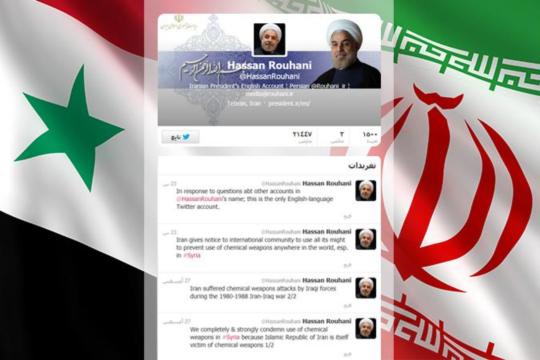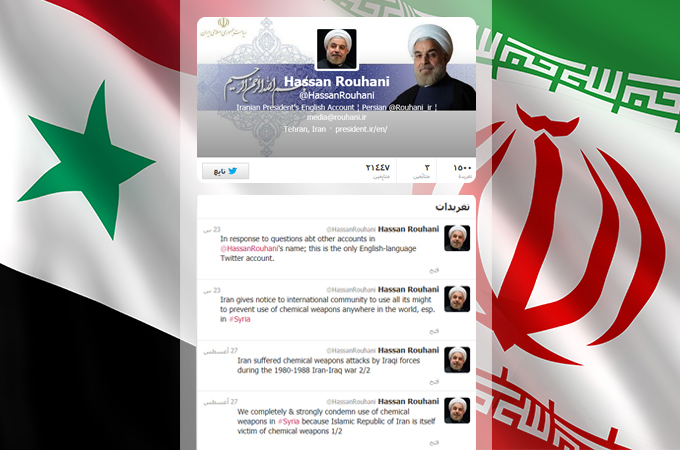
 |
| Source: Al Jazeera |
Has Iran’s position on Syria begun to change? This is a crucial question, as Iran’s tone toward military action against Syria has altered from being threatening throughout years of supporting Bashar al-Assad, to becoming much milder. It appears as though the issues around the chemical weapons instigated this change; the Iranian President, Hassan Rouhani, strongly criticised the use of chemical weapons in a post on Twitter, and his successive tweets supported the forcible prevention of their use. This coincided with international action, led by major powers, to launch a military strike on Syria – Iran’s strategic ally in the region.
Using the ethical pretext
It seems as though the Iranian government is certain about the damning evidence that confirms the Syrian regime’s use of chemical weapons. This causes an ethical dilemma for the Islamic Republic, including in how it presents the case to its citizens. Turning a blind eye to this information would also undermine the decades-long attempts by the Iranian government to punish those responsible for targeting citizens with a similar campaign during the Iran-Iraq war, using internationally banned chemical weapons. Iranian records indicate that the Iranian government is seeking to prosecute 400 international companies accused of providing assistance in the field of chemical weapons to Iraqi President Saddam Hussein’s regime (Al Jazeera Net, 2007).
A Dutch company has already been prosecuted for having been involved. Tehran has hosted several meetings to discuss this issue; one of the most important was the international meeting held in 2007 to discuss the effects of chemical weapons against Iran. Iran annually commemorates the chemical weapons attacks against it by the Iraqi army. The Iranian Foreign Ministry, in collaboration with various Iranian organizations including the Foundation for Protection of Chemical Weapons Victims, also regularly publishes research to discuss the political, legal, medical, and social and human rights aspects of this issue. The Martyr Foundation claims that 100,000 people in Iran were injured as a result of exposure to chemical gases during that war. This issue was brought back to light last week when CIA documents obtained by the Foreign Policy magazine confirmed that Washington assisted Iraqi President Saddam Hussein to launch a chemical attack that used nerve gas against Iranian troops (Harris and Aid, 2013).
We cannot assume that Rouhani’s statement on Twitter (which is banned in Iran) suggests a new Iranian position. However, these tweets are not only Rouhani’s personal opinion, but also reflect a possible change in Tehran’s stance. Although Iran will obscure this change with an ethical pretext, the actual issue might be deeper; it is possible that it is related to Iran’s inability to manoeuvre on the Syrian question. In contrast to previous discourse, the words ‘extremist militant groups’ are not found in Rouhani’s tweets. This may be the beginning of the Iranian president’s quest to follow a more moderate path in Iranian foreign policy on a number of issues, including Syria. Furthermore, Tehran does not want to overstep the Russian position, especially since the Russian government has already softened its position.
The content and tone within the discourse of political and military leaders in Iran clearly indicate a declining possibility of a military confrontation between Iran and the Western powers over Syria. The remarks by the Revolutionary Guards commanders, however, previously asserted that any military action against Syria was a direct strike against Iran. Recent statements have been warnings to the United States that crossing the red line in Syria would have disastrous repercussions (Deutsche Welle, 2013), that the subsequent situation in the region would not be in Israel’s favour, and that Iran would be forced to defend itself against direct and indirect threats (Al Hayat, 2013).
This warning tone dominated the Iranian Supreme Leader Ali Khamenei’s assertion that the intervention of the United States would be disastrous for the region and the US. He maintained that foreign intervention is ‘a spark near a barrel of gunpowder,’ and that it would only lead to stoking the flames of war and conflict (Tabnak, 2013). Despite the reports of Khamenei’s refusal to enter into the Omani mediations, it seems clear that the leader’s issues were warnings, not threats.
It is noticeable that the Chairman of the Iranian Shura Council, Ali Larijani, made stronger statements than those of the military leaders. He also avoided referring to an Iranian reaction, and in relation to the ‘Syrian response’ he said: ‘The potential air raids that are launched against Syria, which has suffered from widespread destruction at the hands of terrorists in the last two years, will not be as harsh as what others will receive from Syria itself. If Westerners and certain countries in the region want to ignore international laws and norms in favour of the Zionist entity during this venture, there is no reason for Syria to respect them either.’
Larijani asserted that it is naïve of the countries ‘participating in a venture against Syria’ to believe they will succeed in a ‘beat and escape’ process with the ability to make subsequent widespread changes. This is especially true given the current circumstances as well as the interests of these countries. If these countries intervene, they will enter into a war with unknown results…their plan seems to be based on weak foundations (Tabnak, 2013).
Larijani's statements may be signalling the formation of a fundamentalist parliamentary bloc opposing Rouhani’s foreign policy, in order to balance the upcoming transformation process. The overall statements of political and military leaders in Iran however, corresponded with the milder tone of major leaders in the Guard and the Army. This concurs with the deep strategic interests in Syria, and the fact that ‘the Iranian response to a military strike will be timely’ (Iran Diplomacy, 2013).
The Syrian crisis headed the talks recently held in Tehran. These took place during the visit by UN envoy Jeffrey Feltman, who was at the forefront accusing al-Assad of assassinating the Lebanese Prime Minister Rafik al-Hariri. Syria was also the focus of Sultan Qaboos’s visit, the Sultan of Oman. It has been reported that he conveyed messages from the US to the Iranian Supreme Leader Ayatollah Ali Khamenei regarding Syria.
An Iranian military response would certainly have a negative impact on its negotiations with the West, and on the issue of sanctions. Tehran does not seem willing to sacrifice its interests for its ally (Iran Diplomacy, 2013).
Undoubtedly, Iran is aware that Syria is in a chaotic state. This makes it difficult for Iran to believe that the Assad regime won’t negatively impact the nuclear talks, which is Iran’s first priority. Iran’s declining ability to manoeuvre on Syria is closely linked to its need to put an end to in its foreign policy relating to a number of issues, particularly Syria. Iran is seeking an influential role in organizing the situation in a post-Assad Syria, which is a similar role to that in Afghanistan. This necessity is enhanced by the fact that a military strike against Syria would make Rouhani’s foreign policy, led by his Foreign Minister Mohammad Javad Zarif, face major complications that would compel Iran to find pragmatic solutions. This is especially true since the selection of Zarif to the Ministry of Foreign Affairs, and since the leader of a negotiating team regarding the nuclear issue sent messages to the United States that Iran is serious about ending the tension and resolving the disputed issues. It is clear that Zarif was part of the negotiating team to stop the Iraq-Iran war, and that he also participated in the negotiations on Afghanistan with the United States after the 9/11 attacks.
Three options
Generally, depending on the overall political conduct of Iran, it has three options in the case of a military strike against Syria (Iran Diplomacy, 2013):
1) Silence: If the military strike was an ‘alert’ to al-Assad’s government, for a limited number of days it will not lead to drastic changes in the balance of power between the regime and the opposition. It is likely that the Islamic Republic will therefore only resort to verbal condemnation. This is supported by the fact that the government seeks to avoid creating new tensions with the world, and that the spiritual government seems determined to strengthen diplomatic relations and negotiated solutions to resolve the nuclear crisis. Rouhani’s government engaging in a clash with the major powers because of a limited military intervention therefore does not make sense.
2) Indirect Intervention: This is related to the US military intervention. If it crosses the limits of being a mere ‘warning’ in causing a change in the power equations between the army of the Syrian regime and the rebels; it will increase the chances of the fall of Bashar al-Assad. This might cause Iran to respond indirectly through Hezbollah, and through some Palestinian factions such as the Popular Front, whose ties with Iran have recently been strengthened. It is unlikely that Hezbollah will be able to move away from the overall Iranian direction. Despite having nearly 60 thousand rockets including several hundred medium-range ones with high destructive ability (al-Doweri, 2013), the involvement of Hezbollah in this war depends on decisions made by Iran, and Hezbollah would have to assess the consequences of striking Israel, as the Israeli response would not be limited.
3) Direct intervention: This scenario seems the least plausible, but not entirely unlikely, considering the path that Iran’s foreign policy has been forging for more than three decades. Iran's position will thus be strongly associated with the Russian and Chinese positions, despite Iran’s preferences to act on its own.
*Dr. Fatima Alsmadi is a Senior Researcher at Al Jazeera Center for Studies and an expert on Iranian affairs. She specialises in Central Asia studies.
**This report was translated from Arabic by the Afro-Middle East Centre (AMEC).
References
1. Al-Doweri, Fayez, ‘Options for military action against Syria, Al Jazeera Center for Studies, 28 August 2013. http://studies.aljazeera.net/reports/2013/08/201382893040564778.htm
2. ‘During its war with Iraq: Iran is after companies it accuses of arming Saddam,’ Al Jazeera Net, 23 October 2007. http://www.aljazeera.net/news/pages/b57820b6-3713-4736-88b8-cb532bc3dcdc
3. ‘Syrian developments: Syria and Iran warned against military action,’ Deutsche Welle. 25 August 2013. http://www.dw.de/%D8%A7%DB%8C%D8%B1%D8%A7%D9%86-%D9%88-%D8%B3%D9%88%D8%B1%DB%8C%D9%87-%D8%AF%D8%B1-%D9%85%D9%88%D8%B1%D8%AF-%D8%AD%D9%85%D9%84%D9%87-%D9%86%D8%B8%D8%A7%D9%85%DB%8C-%D8%A8%D9%87-%D8%B3%D9%88%D8%B1%DB%8C%D9%87-%D9%87%D8%B4%D8%AF%D8%A7%D8%B1-%D8%AF%D8%A7%D8%AF%D9%86%D8%AF/a-17043597
4. Harris, Shane and Aid, Matthew, ‘Secret CIA files prove America helped Saddam and gasses Iran,’ Foreign Policy, 16 August 2013. http://www.foreignpolicy.com/articles/2013/08/25/secret_cia_files_prove_america_helped_saddam_as_he_gassed_iran
5. ‘Iran’s response to a possible strike,’ Iran Diplomacy, 6 August 2012. http://www.irdiplomacy.ir/fa/page/1920478/%D9%88%D8%A7%DA%A9%D9%86%D8%B4+%D8%AA%D9%87%D8%B1%D8%A7%D9%86+%D8%A8%D9%87+%D8%AD%D9%85%D9%84%D9%87+%D8%A7%D8%AD%D8%AA%D9%85%D8%A7%D9%84%DB%8C+.html
6. ‘Will Rouhani’s road be more difficult? The impact of attacking Syria on negotiations with Iran,’ Iran Diplomacy, 6 August 2012. http://www.irdiplomacy.ir/fa/page/1920491/%D8%AA%D8%A7%D8%AB%DB%8C%D8%B1+%D8%AD%D9%85%D9%84%D9%87+%D8%A8%D9%87+%D8%B3%D9%88%D8%B1%DB%8C%D9%87+%D8%A8%D8%B1+%D9%85%D8%B0%D8%A7%DA%A9%D8%B1%D9%87+%D8%A8%D8%A7+%D8%A7%DB%8C%D8%B1%D8%A7%D9%86+.html
7. ‘Iran’s options in face of a military strike on Syria,’ Iran Diplomacy, 6 September 2013. http://www.irdiplomacy.ir/fa/page/1920484/%DA%AF%D8%B2%DB%8C%D9%86%D9%87+%D9%87%D8%A7%DB%8C+%D8%A7%DB%8C%D8%B1%D8%A7%D9%86+%D8%AF%D8%B1+%D8%A8%D8%B1%D8%A7%D8%A8%D8%B1+%D8%AD%D9%85%D9%84%D9%87+%D8%A8%D9%87+%D8%B3%D9%88%D8%B1%DB%8C%D9%87+.html
8. ‘America will lose in Syria as in Iraq and Afghanistan,’ Tabnak News, 28 August 2013. http://www.tabnak.ir/ar/news/14656/
9. ‘Ali Larijani: Fanning the flames of war will harm the naive countries in the region,’ Tabnak News, 28 August 2013. http://www.tabnak.ir/ar/news/14657/
Copyright © 2013 Al Jazeera Center for Studies, All rights reserved.